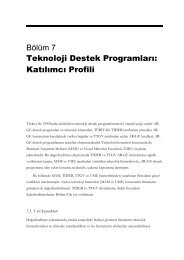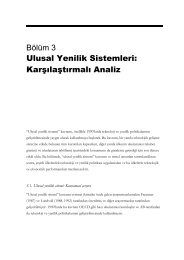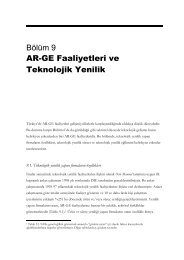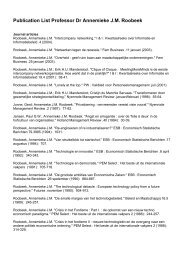Eleventh Five Year Plan
Eleventh Five Year Plan
Eleventh Five Year Plan
Create successful ePaper yourself
Turn your PDF publications into a flip-book with our unique Google optimized e-Paper software.
178 <strong>Eleventh</strong> <strong>Five</strong> <strong>Year</strong> <strong>Plan</strong>Moreover, incentives in the form of rebate on watercess, concessions in customs and excise duty onequipment and machinery, tax holiday, etc., shouldbe considered by the GoI for agencies dealing withplanning, developing, and operating such reusetreatment plants as well as users of treated sewageand trade effluents. Similarly, for dense urbanneighbourhoods, decentralized waste treatmentsystems that are cheaper and reduce the distancethat the sewage is transported form a viable alternativeto large treatment plants.• Targeted subsidy may be made available to theSCs and STs, and other disadvantaged groupsliving in urban slums on taking house service connectionsfor water supply/sewerage, metering,construction of latrine, subsidized water rates, etc.and accordingly adequate funds may be earmarkedfor the purpose so as to avoid any possible diversionof funds by the State Governments/ULBs.At the same time internal earmarking of funds forthe urban slums under JNNURM/UIDSSMTschemes should be made mandatory. It is alsovery much necessary to monitor the physicaland financial progress of the implementation ofsuch programmes on a regular basis by the fundingagencies so as to ensure fulfilment of the envisagedobjectives.• Comprehensive storm water drainage system hasto be provided in all the cities and towns basedon need, in order to avoid water logging in residentialareas/flooding of streets during the monsoonperiod.• There is a need to have a national centre for waterexcellence, which looks at especially the drinkingwater and sanitation sector in rural and urbanwater areas.• We need to find a way to provide sewerage facilitiesto unauthorized housing colonies without givingthem a right to the land by implication.SOLID WASTE MANAGEMENT (SWM)• Urban waste management by ULBs is alreadyunder stress because of paucity of resources andinadequacies of the system. Unless concerted effortsare made to improve the flow of resources toSWM and build up systems that incorporate thebasic requirements of a proper waste managementpractice, the problem of urban waste will be furtheraggravated and cause environmental healthproblems.• It is recommended that all the cities and towns haveto be provided with appropriate SWM facilities givingdue emphasis to the magnitude of the problem.• Soil fertility is being badly affected by excessive useof chemical fertilizers and inadequate use of organicfertilizers. Large quantities of urban waste can bea useful solution to this problem. Compulsory productionof compost from urban solid waste in citiesand towns and promotion of application of thisorganic manure in agriculture and horticultureshould be implemented, as this may have a significantpositive impact on soil fertility.• The Report of the Inter Ministerial Task Force onthe ‘Integrated <strong>Plan</strong>t Nutrient Management usingcity compost’ constituted by the Ministry of UrbanDevelopment in March 2005 as per the directive ofthe Hon’ble Supreme Court of India has recommendedtechnical, financial, qualitative, marketing,and sustainability aspects of utilization of MunicipalSolid Waste for compost purpose. Recommendationsof the Task Force need to be implementedthrough provision of various fiscal incentives/concessions.• Quality standards for compost will have to be prescribedby Bureau of Indian Standards at the earliest.At the same time, it should be made mandatorythat compost sold in the market should clearlyindicate the exact chemical composition (Nitrogen,Phosphorus, and Potassium, NPK, etc.) on the bagsfor the benefit of users.• To the extent possible materials such as metal, glass,plastic, rubber, tin, and paper available in themunicipal waste must be recycled back as theyhave adequate salvage value. Inorganic and inertmaterial such as sand, grit, stones, bricks, concrete,rubble, etc. may also be used for making low-costbricks, road material, aggregates, etc. As such,efforts should be made to reuse the same andenough incentives in the form of tax concessions,subsidies, etc. may be given to the entrepreneursdealing with such materials/processes.• Our cities are littered with uncollected solid wasteand no public place or street is free of litter. Thoughmuch recycling takes place by rag pickers and waste




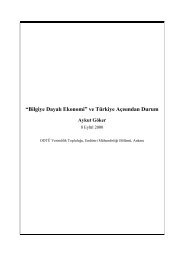
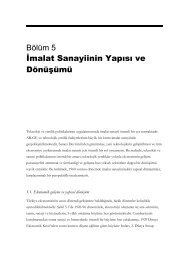
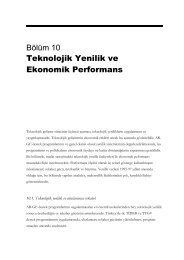
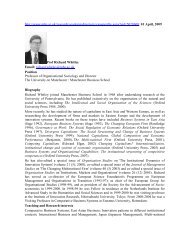

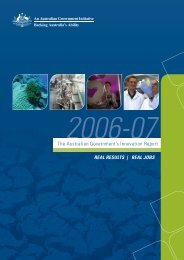
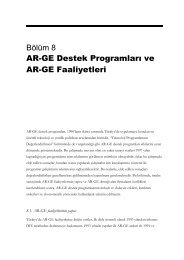

![[Tam] Uygula[ya] - Bilim, Teknoloji ve Ä°novasyon Politikaları TartıÅma ...](https://img.yumpu.com/36820041/1/184x260/tam-uygulaya-bilim-teknoloji-ve-anovasyon-politikalara-tartaama-.jpg?quality=85)
